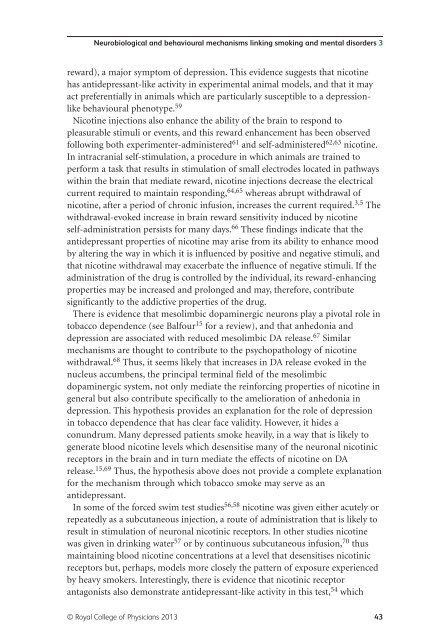Smoking and mental health - NCSCT
Smoking and mental health - NCSCT
Smoking and mental health - NCSCT
Create successful ePaper yourself
Turn your PDF publications into a flip-book with our unique Google optimized e-Paper software.
Neurobiological <strong>and</strong> behavioural mechanisms linking smoking <strong>and</strong> <strong>mental</strong> disorders 3<br />
reward), a major symptom of depression. This evidence suggests that nicotine<br />
has antidepressant-like activity in experi<strong>mental</strong> animal models, <strong>and</strong> that it may<br />
act preferentially in animals which are particularly susceptible to a depressionlike<br />
behavioural phenotype. 59<br />
Nicotine injections also enhance the ability of the brain to respond to<br />
pleasurable stimuli or events, <strong>and</strong> this reward enhancement has been observed<br />
following both experimenter-administered 61 <strong>and</strong> self-administered 62,63 nicotine.<br />
In intracranial self-stimulation, a procedure in which animals are trained to<br />
perform a task that results in stimulation of small electrodes located in pathways<br />
within the brain that mediate reward, nicotine injections decrease the electrical<br />
current required to maintain responding, 64,65 whereas abrupt withdrawal of<br />
nicotine, after a period of chronic infusion, increases the current required. 3,5 The<br />
withdrawal-evoked increase in brain reward sensitivity induced by nicotine<br />
self-administration persists for many days. 66 These findings indicate that the<br />
antidepressant properties of nicotine may arise from its ability to enhance mood<br />
by altering the way in which it is influenced by positive <strong>and</strong> negative stimuli, <strong>and</strong><br />
that nicotine withdrawal may exacerbate the influence of negative stimuli. If the<br />
administration of the drug is controlled by the individual, its reward-enhancing<br />
properties may be increased <strong>and</strong> prolonged <strong>and</strong> may, therefore, contribute<br />
significantly to the addictive properties of the drug.<br />
There is evidence that mesolimbic dopaminergic neurons play a pivotal role in<br />
tobacco dependence (see Balfour 15 for a review), <strong>and</strong> that anhedonia <strong>and</strong><br />
depression are associated with reduced mesolimbic DA release. 67 Similar<br />
mechanisms are thought to contribute to the psychopathology of nicotine<br />
withdrawal. 68 Thus, it seems likely that increases in DA release evoked in the<br />
nucleus accumbens, the principal terminal field of the mesolimbic<br />
dopaminergic system, not only mediate the reinforcing properties of nicotine in<br />
general but also contribute specifically to the amelioration of anhedonia in<br />
depression. This hypothesis provides an explanation for the role of depression<br />
in tobacco dependence that has clear face validity. However, it hides a<br />
conundrum. Many depressed patients smoke heavily, in a way that is likely to<br />
generate blood nicotine levels which desensitise many of the neuronal nicotinic<br />
receptors in the brain <strong>and</strong> in turn mediate the effects of nicotine on DA<br />
release. 15,69 Thus, the hypothesis above does not provide a complete explanation<br />
for the mechanism through which tobacco smoke may serve as an<br />
antidepressant.<br />
In some of the forced swim test studies 56,58 nicotine was given either acutely or<br />
repeatedly as a subcutaneous injection, a route of administration that is likely to<br />
result in stimulation of neuronal nicotinic receptors. In other studies nicotine<br />
was given in drinking water 57 or by continuous subcutaneous infusion, 70 thus<br />
maintaining blood nicotine concentrations at a level that desensitises nicotinic<br />
receptors but, perhaps, models more closely the pattern of exposure experienced<br />
by heavy smokers. Interestingly, there is evidence that nicotinic receptor<br />
antagonists also demonstrate antidepressant-like activity in this test, 54 which<br />
© Royal College of Physicians 2013 43














